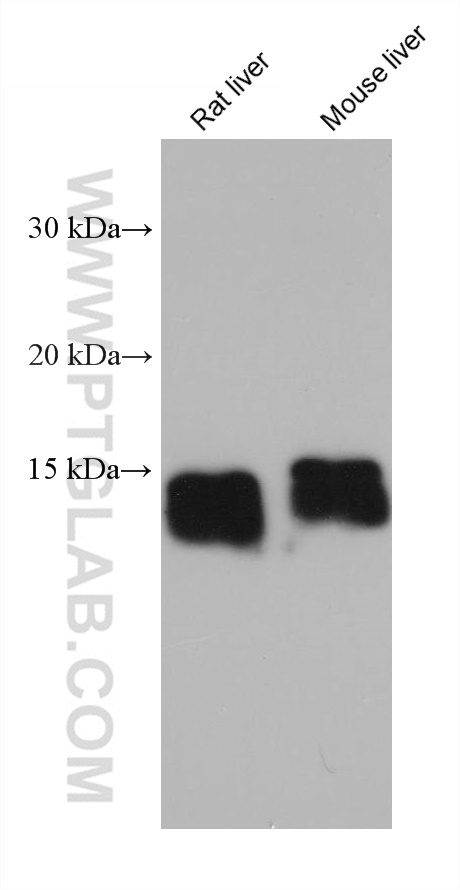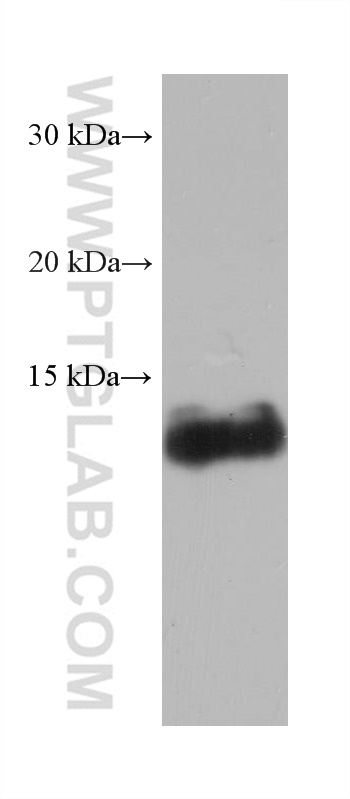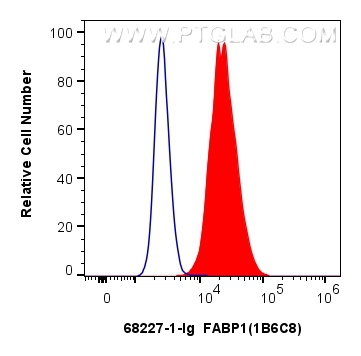验证数据展示
经过测试的应用
| Positive WB detected in | rat liver tissue, pig liver tissue, mouse liver tissue |
| Positive FC (Intra) detected in | HepG2 cells |
推荐稀释比
| 应用 | 推荐稀释比 |
|---|---|
| Western Blot (WB) | WB : 1:5000-1:50000 |
| Flow Cytometry (FC) (INTRA) | FC (INTRA) : 0.80 ug per 10^6 cells in a 100 µl suspension |
| It is recommended that this reagent should be titrated in each testing system to obtain optimal results. | |
| Sample-dependent, Check data in validation data gallery. | |
产品信息
68227-1-Ig targets FABP1 in WB, FC (Intra), ELISA applications and shows reactivity with human, mouse, rat, pig samples.
| 经测试应用 | WB, FC (Intra), ELISA Application Description |
| 经测试反应性 | human, mouse, rat, pig |
| 免疫原 | FABP1 fusion protein Ag32836 种属同源性预测 |
| 宿主/亚型 | Mouse / IgG1 |
| 抗体类别 | Monoclonal |
| 产品类型 | Antibody |
| 全称 | fatty acid binding protein 1, liver |
| 别名 | liver FABP, L-FABP, Fatty acid-binding protein, liver, Fatty acid-binding protein 1, Fatty acid binding protein 1 |
| 计算分子量 | 127 aa, 14 kDa |
| 观测分子量 | 14 kDa |
| GenBank蛋白编号 | BC032801 |
| 基因名称 | FABP1 |
| Gene ID (NCBI) | 2168 |
| RRID | AB_2935315 |
| 偶联类型 | Unconjugated |
| 形式 | Liquid |
| 纯化方式 | Protein G purification |
| UNIPROT ID | P07148 |
| 储存缓冲液 | PBS with 0.02% sodium azide and 50% glycerol pH 7.3. |
| 储存条件 | Store at -20°C. Stable for one year after shipment. Aliquoting is unnecessary for -20oC storage. |
背景介绍
FABP1, liver fatty acid-binding protein, is abundant in cytoplasm that regulates lipid transport and metabolism. It plays a role in lipoprotein-mediated cholesterol uptake in hepatocytes (PMID:25732850). FABP1 is mainly expressed in hepatocytes, enterocytes and to a lesser degree in renal tubular cells, associated with liver injury (PMID: 15653098). Levels of FABP1 was elevated in patients with hepatocyte injury secondary to alcohol or drug toxicity (PMID: 14563446).
实验方案
| Product Specific Protocols | |
|---|---|
| WB protocol for FABP1 antibody 68227-1-Ig | Download protocol |
| FC protocol for FABP1 antibody 68227-1-Ig | Download protocol |
| Standard Protocols | |
|---|---|
| Click here to view our Standard Protocols |


